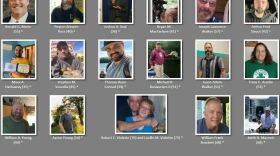On April 20th, 1999, Andy McDonald was 17 years old, taking a math test at Columbine High School in Colorado, when he and his fellow students heard gunshots. He says they were so loud the walls seemed to vibrate. Then the fire alarm went off and he and some of his classmates left the school.
He was not physically harmed, but in less than an hour, two students killed more than a dozen of their classmates and a teacher, including themselves, and wounded several others. The massacre shocked the country and left people like Andy McDonald with horrific memories. McDonald now lives in Plymouth, New Hampshire, where he teaches social studies to 7th and 8th graders.
I met with McDonald recently and started out by asking him what goes through his mind when he hears about shootings like the one in Parkland, Florida.
Andy McDonald: Not again. This time was a little bit different and I’m not sure what it was. When these things happen, I usually get fairly sad and go through those sets of emotions. But I was really angry after this one and that’s just not who I am. It’s not my nature to be that way, so it was tough and I couldn’t quite figure out for a long time why I was so angry. I’m still kind of working through it, but it’s one of those things. I’m still trying to figure out how to make sense of it all.
PB: I imagine it’s a process and that takes some time.
Yeah. I’d always thought that after Newtown something would be done. From where I sit, there’s a lot of different things I think need to happen in order for some meaningful change to happen.
What are those things?
I don’t understand the need for semiautomatic rifles. Ever since Columbine, I’ve been a big proponent of universal background checks. I’m not one of those people who thinks the Second Amendment needs to go away. At the same time, I think you can do away with those things and still be compatible within that realm. And I know there are people out there who say, “Bad people who want to do damage will do damage.” And I understand that. But at the same time, I still feel like you have to at least take some steps to prevent that. You can’t just do nothing, and I think that’s where part of my frustration was coming from when it came to what happened in Parkland.
Do your students ever ask you about what happened at Columbine? If so, what do they ask, and what do you say?
They do. Every other year we bring a program called Rachel’s Challenge to our school. It’s founded by the family of Rachel Scott, who was the first person killed at Columbine, who was a friend of mine. She was my homecoming date that year. So it’s not an anti-bullying campaign. It’s basically: how can we be a more kind and compassionate as individuals?
Through my connection at Columbine and my connection with the program, I share my experiences with the kids and just tell them that how you treat each other is really important, because you never know when that can happen. And I don’t have those conversations every day, but it comes up when those moments come up.
After Parkland, the debate that seems to happen every time happened once more. There are people who want an extreme form of gun control and the other side, groups like the NRA, wants people like you, teachers, to be armed. What do you think of that proposal?
It’s not something that jumps out as a good idea. I haven’t explored enough. For me, personally, I don’t think it would be something I’d be interested in. I think it’s hard enough for teachers to be in a situation like that and then—police officers have a hard enough time determining who a bad guy is in a situation like that, and that’s their job.
To say that it can be done with a certain number of hours of training—I don’t think it’s realistic. That’s where I come down on it.
What do you think when you see the high school students in Parkland, Florida, speaking out about their political views after what happened last month?
I think it’s something they’re absolutely entitled to. My concern, having been through those experiences, is—I really hope that that is part of their healing process one way or the other, that they’re getting support somehow. I just hope that they have time to process what’s actually happened. Because it’s something that’s going to live with them and stay with them for the rest of their lives. And it’s something that, for the rest of their lives, they’ll be identified with. For a long time, I was always “the Columbine Kid” and it’s not a place anymore. It’s an event. It’s not a community, it’s a tragedy. Their experiences together will bring them closer as a result of that, but it’s a tough road and I just really hope that they’re getting the emotional help they need so they can begin to deal with what’s going to be their new normal.
What advice would you give to them?
Make sure that you’re talking with people. If you’re struggling…that’s the biggest thing. Making sure it’s not staying inside, that you have the ability to talk with people, to process. For me, it was doing some of the same things that a lot of these students are doing, which is traveling and speaking about their experiences. That, for me, was very helpful—through Crimestoppers and Rachel’s Challenge. So that would be the biggest thing is making sure they’re taking care of themselves just so they can begin to adapt with what life is going forward.








